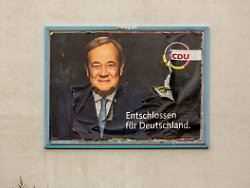Saturday 30th October 2021
With whom at the top and where?
CDU listens closely to itself at crisis meetings
The CDU drummed up the base after the election failure. More than 300 district chairmen are to advise the party leadership on how to proceed – in terms of content and personnel. The focus is on the question of how much basic participation is allowed.
After the severe defeat in the Bundestag election in September, the CDU initiated a new beginning. The 326 district leaders of the party will meet in Berlin during the day. Central topics of the conference – in addition to dealing with the miserable election result of the Union of 24.1 percent – will be:
- Should the new chairperson be determined by a member’s decision?
- And should a dual leadership of men and women lead the party in the future?
At the base there are strong efforts for a membership vote. In Saxony-Anhalt, several district association chiefs had spoken out in favor of a switching conference, as participants said. The editorial network Germany determined in a survey of a fifth of the district associations a clear majority in favor of a vote of all members. According to “Welt”, there are also 13 district associations that only require a member survey for decisions about the candidacy for chancellor.
However, according to the CDU party statute, the election of the chairman is reserved for a party congress. A member survey could only precede a party congress, which then makes a decision. For a dual leadership, the statute would have to be changed first.
No resolutions
The district chairmen’s conference, chaired by party leader Armin Laschet, cannot pass resolutions, but can only obtain an opinion from the grassroots. The 27 district chairmen are also invited. Decisions will only be made in the special meetings of the federal executive board and the presidium on Tuesday.
CDU vice and state chairwoman of Rhineland-Palatinate, Julia Klöckner, announced after consultations with her 36 district chairmen that the unanimous opinion was that “new and regular formats for member participation” were necessary. With the election of the new party chairman, the desire for an “amicable team solution including general secretary” is great.
Should there be a member survey, it is imperative that the losing candidates no longer run at the election party congress. Only in this way could the delegates correspond more closely to the will of the grassroots. “Our district chairmen are skeptical about the question of dual leadership in the federal party,” said Klöckner. “And we are in favor of a kind of Union Council so that our sister parties can tackle controversial and important issues in this format early and constructively together.”
The new Bundestag Vice President of the Union, Yvonne Magwas, advocated not ruling out dual leadership from the outset. “My concern is: Let’s just discuss this issue openly without rejecting it right away,” said the CDU politician from Saxony. “There are also advantages of dual leadership. As a party, you make an offer to the voters, to the citizens. And, in my opinion, the offer at the Union can be a bit broader than it may have been in the past. “
One of the potential candidates for the party chairmanship and thus the successor to Armin Laschet, Norbert Röttgen, was open to grassroots involvement. In principle, he was in favor of the representative party congress principle, he told the newspapers of the Funke media group. “If in this particular situation a considerable part of the grassroots announces that the members want to be an active part of the new beginning and therefore want a member survey, then I welcome and support that.” The vice-parliamentary group leaders Thorsten Frei and Johann Wadephul expressed themselves similarly in the RND.
Merz for a third party?
Young Union boss Tilman Kuban told the “Rheinische Post” that it was “time for the Union to start over with a new basic program, the Union Council, which puts the relationship between CDU and CSU on a new footing, and a member survey of several candidates for the party chairmanship “. A survey can be quickly implemented by voting for an urn in the district offices.
The chairman of the Berlin CDU district association Steglitz-Zehlendorf warned against reducing the debate about a renewal of the party to personnel issues. He expected personnel offers that were linked to content and conceptual offers and answered the question of where the CDU was actually going, said Thomas Heilmann.
According to a survey, citizens consider Friedrich Merz to be the most suitable candidate for the CDU chairmanship. 23 percent trust the economic politician to take office, 19 percent consider the foreign politician Röttgen to be the most suitable. 11 percent are in favor of the managing health minister Jens Spahn, 6 percent in favor of parliamentary group leader Ralph Brinkhaus, and 5 percent in favor of economic politician Carsten Linnemann, as can be seen from the ARD’s “Germany trend”. With the Union supporters, Merz is therefore even more clearly ahead with 36 percent. 25 percent think Röttgen is suitable, 14 percent Spahn, 9 percent Linnemann and 6 percent Brinkhaus.
